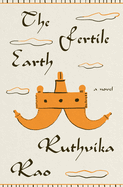
Ruthvika Rao's ambitious and spellbinding debut novel, The Fertile Earth, is set during India's post-Partition years, from 1955 to 1990. It closely follows two families: the Deshmukhs, the zamindars of Irumi, "feudal landlords, rulers and administrators of law, taxation and cruelty"; and Pichamma, washerwoman to the Deshmukhs, and her two sons, Ranga and Krishna.
Rao makes the sweeping changes happening in India during those years feel personal and intimate through the friendship and blossoming romance of Vijaya Deshmukh and Krishna, who live in Irumi, "a remote Telangana hamlet." Vijaya asks Krishna if he will go with her to hunt the man-eating tiger threatening the village. In Vijaya, Rao convincingly creates a rebellious spirit, indifferent to her privilege. If their friendship is forbidden, the tiger hunt is unthinkable. Yet rule-abiding Krishna gets drawn into Vijaya's plans. He brings his older, risk-taking brother, Ranga, along on the excursion, and Vijaya brings her younger sister, Sree, to seal the girl's silence. The cataclysmic event of the tiger hunt and its fallout ripples through each of the quartet's individual paths, forever changing them and their families.
Rao movingly writes of the scars of the caste system, as Pichamma tells Krishna, "he will never in life be given the things he deserves, but only the things he earned." Through her fully realized characters, she gives readers a window into the complexities of a nation still defining itself. Rather than offering readers answers, she invites them into the hard questions, reminding them even the cruelest people are capable of compassion, and even the most sympathetic can be selfish; sometimes it's hard to know which is worse. --Jennifer M. Brown, reviewer

